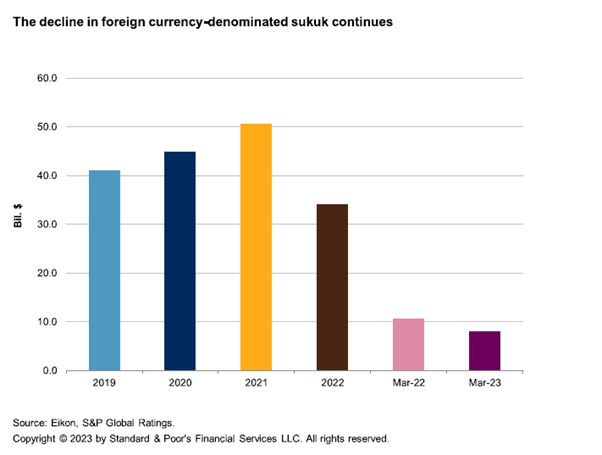The global Islamic finance industry is expected to continue its growth trend of around 10% in 2023, which is similar to the 9.4% asset growth seen in 2022 and driven by core markets in Gulf Cooperation Council (GCC) countries, according to a recent report.
Despite slowing overall sukuk issuance volumes, it continued to spur the industry's expansion, finds the S&P Global Ratings report. In 2022, sukuk issuance globally exceeded market expectations by reaching US$193.9 billion, representing only a slight drop from its record volume issuance in 2021, according to the Refinitiv Islamic Finance research team.
However, there has been a significant decline in foreign currency-denominated sukuk issuance over the past 12 months, as S&P Global Ratings notes, due to more expensive global liquidity.
As well, global sukuk and bond markets are also affected by more challenging funding conditions, Fitch Ratings states, as a result of global monetary tightening, volatilities in oil prices, weak global growth outlook, high inflation and geopolitical risks.

Furthermore, the market continues to face challenges related to uncertainty around regulation and standardization. For instance, the adoption of AAOIFI Standard 59 in the United Arab Emirates (UAE) has resulted in significant declines in foreign currency-denominated sukuk, dropping from around US$10 billion per year in 2018-2020 to around US$4 billion per year in 2021-2022.
Local currency debt issuance is becoming an attractive option, according to a leading international Islamic bank. One reason cited for the option’s attractiveness is the desire to establish a local market and provide investment opportunities for local banks and investors. The government and central bank are also providing credible instruments for investment purposes and to manage liquidity.
The UAE government, for example, launched the 1.1 billion dirham (US$299.5 million)-denominated Islamic Treasury Sukuk last month to help build a local currency bond market and boost the Islamic economy.
In February, Emirates Islamic Bank, launched the first 1 billion dirham-denominated sukuk issuance by a UAE bank. The three-year issue was oversubscribed 2.5 times, with the orderbook exceeding 2.5 billion dirham. This successful issuance helped the bank tighten the profit rate to 5.05% at a spread of 67 basis points over UAE government treasuries.
The size of the UAE’s debt capital market (DCM) was around US$245 billion in the first quarter of 2022. Outstanding dirham-denominated bonds and sukuk amount to approximaely US$31.6 billion, 12.8% of the total DCM, with issuance mainly from the central bank and other government agencies. The volume of outstanding dirham-denominated sukuk reached US$1.5 billion at the close of Q1 2022, according to Fitch Ratings’ report.
Another reason mentioned by the banker for the dirham-denominated increase is that issuing in local currency reduces currency risk and can be more cost effective for issuers. It may also serve as a benchmark for local companies with limited exposure and familiarity with international investors, which could help them fulfil their financing needs with lower costs and diversify their investors and funding sources.
However, the same banker notes, the local currency market may still be opportunistic and nascent, an opinion that Fitch Ratings holds as well.
“Investors would also benefit from the UAE dirham’s peg to the US dollar, with no additional currency risk exposure,” says Bashar Al Natoor, global head of Islamic finance at Fitch Ratings. “However, investing in the broader corporate debt market spectrum could entail additional credit risk.”








